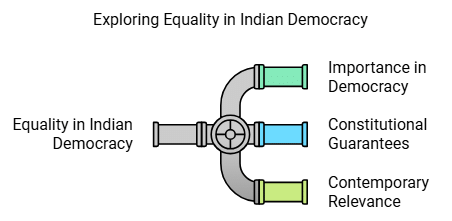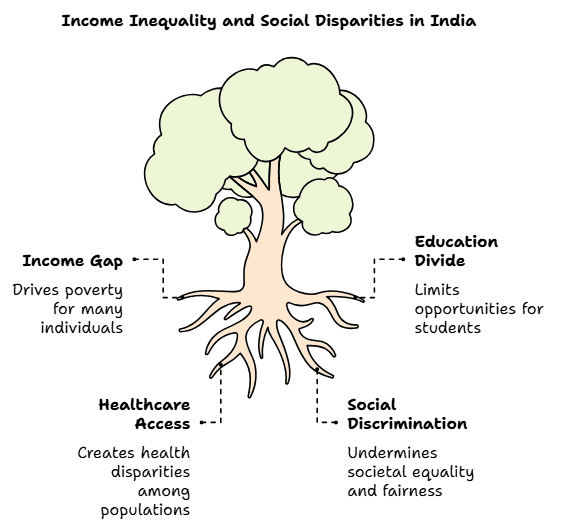On Equality Summary Class 7 Civics Chapter 1
| Table of contents |

|
| Introduction |

|
| Constitutional Assurance |

|
| Disparities in Daily Life |

|
| Government Interventions |

|
| Global Perspective |

|
| Dynamics of Equality and Democracy |

|
| Practical Application |

|
Introduction

Understanding Equality
Equality means acknowledging that every person in the country, regardless of gender, caste, religion, tribe, education, or economic status, is considered equal. However, many people in India still experience significant inequalities in their daily lives.
- Why Does Equality Matter in Democracy?
Equality is crucial in a democracy because it ensures that everyone can engage and gain from the system. This section discusses how the government plays a role in creating laws and policies aimed at reducing existing inequalities. - What is This Chapter About?
This Unit introduces learners to the essential role of equality in democracy, specifically in India. It highlights the ongoing inequalities faced by various communities to emphasise the need for equality.
Constitutional Assurance
- What Our Constitution Says
The Indian Constitution ensures that all citizens are treated equally under the law (Article 14). It forbids discrimination based on religion, race, caste, gender, or birthplace (Article 15) and guarantees equal opportunities in public jobs and education (Article 16). Additionally, the practice of untouchability has been abolished, allowing everyone access to public spaces like playgrounds, hotels, shops, and markets. - How Does Reservation Work?
To rectify past injustices, India has a reservation policy that reserves a percentage of seats in education and jobs for certain communities. This highlights the government's role in enacting laws and policies aimed at reducing existing inequalities. - Why Do We Have Reservation?
Reservation helps rectify past discrimination by providing disadvantaged groups a fair opportunity to succeed and participate equally in society. - Does Reservation Apply Everywhere?
Reservation aims to rectify historical injustices, and its application may evolve as society changes. It is part of a broader commitment to equality through laws and government initiatives that support disadvantaged groups. - Is Reservation Permanent?
Reservation policies are not applied universally but are based on specific guidelines that dictate their implementation. - How Does Reservation Impact Communities?
Reservation has enabled many marginalized communities to improve their access to education and jobs, thereby enhancing their quality of life. - Is Reservation Enough?
Achieving equality in a democratic society is an ongoing effort, with contributions from individuals and communities throughout India.

Disparities in Daily Life
- Income Inequalities: Daily life in India is unequal, with a notable income gap where some individuals earn a lot while others struggle to meet basic needs.
- Education Divide: Many schools still discriminate against Dalit children, limiting opportunities and creating an education divide.
- Unequal Access to Healthcare: Although the midday meal programme has boosted school attendance for poorer children, there are still large disparities between schools for the rich and those for the poor. Access to quality healthcare is not universal, leading to varied health outcomes.
- Social Discrimination: Discrimination based on caste, religion, or gender persists. Attitudes change slowly, and despite awareness of anti-discrimination laws, unequal treatment continues.
Why Does Gender Equality Matter?
Gender equality guarantees that all individuals, regardless of gender, have the same rights and opportunities. Achieving equality in a democratic society is an ongoing effort contributed to by individuals and communities across India.
Government Interventions
- Laws to Ensure Equality: The government has an important role in advancing equality by creating laws and policies that help reduce inequalities and offer opportunities for all. In India, there are several laws that protect each individual's right to equal treatment.
How Does Affirmative Action Help?
Affirmative action means taking steps to ensure that underprivileged groups have equal chances, providing them with support where it is needed.
- Reservation in Education: Reservation in education, as part of government initiatives, assists students from disadvantaged communities in accessing quality education and higher learning.
- Reservation in Jobs: Reservation in employment, through government programmes, guarantees that individuals from less advantaged backgrounds can obtain jobs in the government and public sectors.
Is Affirmative Action Fair to All?
There are debates about whether affirmative action is fair, with some arguing it may disadvantage those who do not benefit from it.
Global Perspective
- Inequality Is a Global Issue: Inequality is not just an Indian problem; it is a global issue, affecting even powerful countries like the United States.
- Inequality in the USA: The United States also faces challenges of inequality, offering lessons that can inform India's approach to addressing these issues.
Dynamics of Equality and Democracy
- Laws Are Not Fixed:Laws can evolve over time to address new issues and create a more just society, showing how democracy adapts to ensure fairness.
- People’s Movements: Citizen movements play an essential role in pushing for equality and can lead to significant societal changes.
How Can Young People Contribute?
Young people can contribute to building a more equal society by staying informed and raising awareness about inequality.
Practical Application
- Local Examples Matter: Using local situations helps make the discussion on key concepts more relevant and applicable.
- Empathy and Respect: Discussing equality in the classroom necessitates empathy and a strong commitment from teachers to ensure that the dignity of all learners is upheld.
What Can We Do?
As students, we can engage in conversations about equality, raise awareness, and strive for a fairer society. It is also important to acknowledge the government's role in creating laws and policies to reduce existing inequalities, as this is a crucial part of their responsibilities.
Conclusion
The fight for equality is a global issue affecting many democratic countries, including India. It is essential to recognise that equality and democracy are concepts that can evolve over time, contributing to a better society for all.
|
63 videos|552 docs|46 tests
|
FAQs on On Equality Summary Class 7 Civics Chapter 1
| 1. What is the importance of the Constitution in ensuring equality in India? |  |
| 2. How do government interventions help reduce disparities in daily life? |  |
| 3. What are some examples of disparities in daily life that people face? |  |
| 4. How does the global perspective on equality differ from India's approach? |  |
| 5. In what ways can individuals contribute to promoting equality and democracy in society? |  |





















